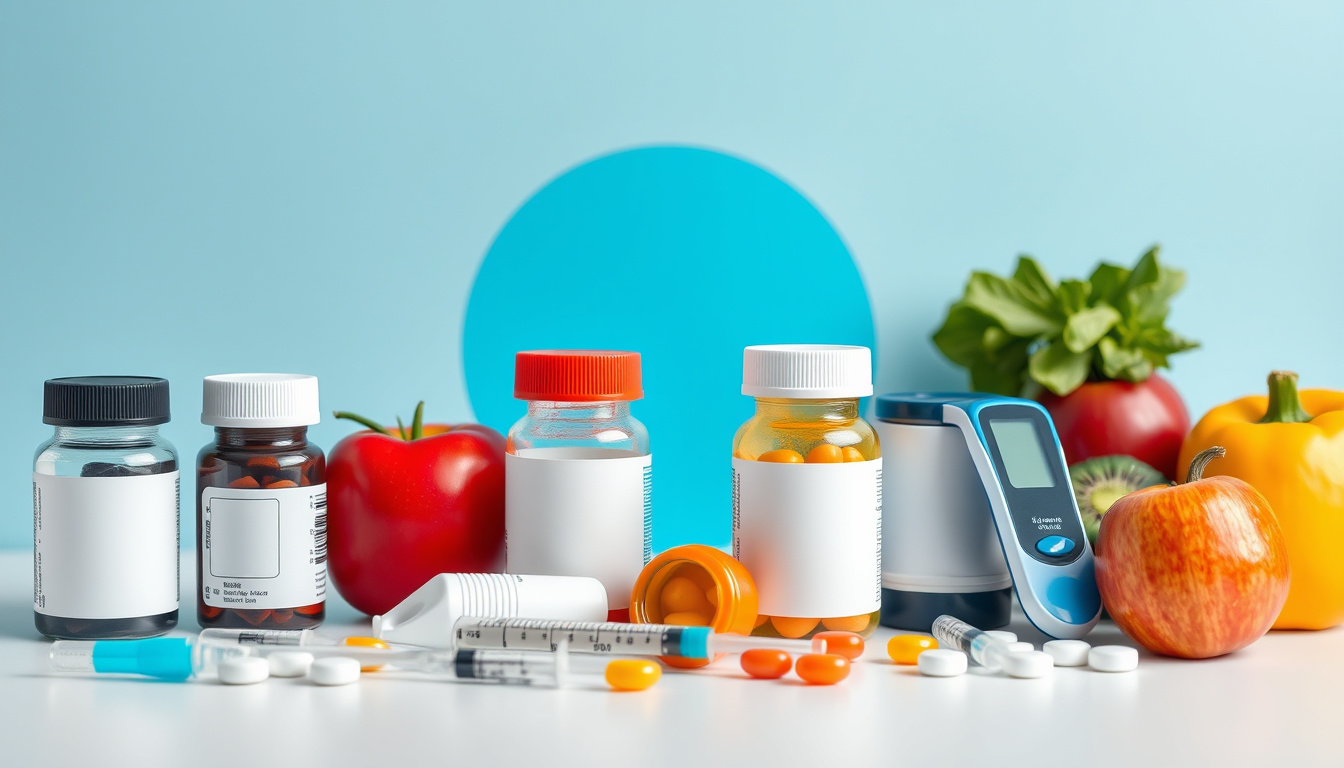Top Medicines for Managing High Blood Sugar: Effective Solutions for Diabetes Control
 Jill Smith
Jill Smith
High blood sugar, or hyperglycemia, is a hallmark of diabetes, a chronic condition where the body struggles to regulate glucose levels effectively. Managing high blood sugar is crucial to preventing diabetes-related complications and maintaining overall health. Medication plays a central role in blood sugar control, especially for individuals with type 1 or type 2 diabetes. This article explores the most effective medicines for managing high blood sugar, highlights their mechanisms, and offers guidance on their use.
Understanding High Blood Sugar and Diabetes
Blood sugar (glucose) is the body's main energy source derived from food. Insulin, a hormone produced by the pancreas, helps cells take up glucose and use it for energy or store it for later. In diabetes:
- Type 1 diabetes is characterized by the immune system attacking insulin-producing cells, resulting in little to no insulin production.
- Type 2 diabetes involves insulin resistance, where the body produces insulin but cells respond poorly, and sometimes a gradual decline in insulin production.
When insulin function is impaired, glucose accumulates in the bloodstream, leading to high blood sugar levels that require management through lifestyle changes and medications.
Medications for High Blood Sugar Management
Diabetes medications either increase insulin levels, enhance the effectiveness of insulin, reduce glucose production, or promote glucose excretion. The choice of medication depends on the type of diabetes, severity, individual health factors, and patient preferences.

For Type 1 Diabetes – Insulin Replacement
Since the body does not produce sufficient insulin, insulin therapy is mandatory to control blood sugar.
-
Types of Insulin:
- Rapid-acting: Begins working within 15 minutes and lasts 2–4 hours (e.g., insulin lispro, aspart, glulisine).
- Short-acting: Starts within 30 minutes, peaks in 2–3 hours, lasting up to 6 hours (e.g., Regular insulin).
- Intermediate-acting: Starts in 2–4 hours, peaks around 12 hours, lasts 12–18 hours (e.g., NPH insulin).
- Long-acting: Provides a steady insulin level for up to 24 hours or longer without a peak (e.g., insulin glargine, detemir, degludec).
-
Delivery: Insulin is administered via injections or insulin pumps.
-
Combination (Premixed) Insulins: Mixes of short- and intermediate-acting insulin for convenience.
-
Amylinomimetic Injectables (Pramlintide): Used alongside insulin to slow gastric emptying and reduce post-meal glucose spikes.
For Type 2 Diabetes – Diverse Medication Options
Type 2 diabetes treatments may include oral medications and/or injectable agents (including insulin) to improve insulin sensitivity, increase insulin secretion, or reduce glucose absorption.
1. Biguanides
- Metformin is the first-line medication for type 2 diabetes.
- How it works: Decreases glucose production in the liver and increases insulin sensitivity in muscles.
- Benefits: Weight-neutral or may promote modest weight loss; low risk of hypoglycemia.
- Common side effects: Gastrointestinal upset, such as diarrhea and nausea.
2. Sulfonylureas
- Stimulate the pancreas to secrete more insulin.
- Examples: Glipizide, glimepiride, glyburide.
- Benefits: Effective and affordable.
- Risks: May cause hypoglycemia and weight gain.
3. Dipeptidyl Peptidase 4 (DPP-4) Inhibitors
- Prolong the action of incretin hormones (GLP-1 and GIP) that regulate insulin and glucose.
- Examples: Sitagliptin, saxagliptin, linagliptin.
- Benefits: Low risk of hypoglycemia, weight neutral.
- Side effects: Mild respiratory symptoms, headache.
4. Glucagon-Like Peptide 1 (GLP-1) Receptor Agonists and Dual GLP-1/GIP Agonists
- Mimic incretin hormones, enhancing insulin secretion, suppressing glucagon, and slowing stomach emptying.
- Examples: Dulaglutide, liraglutide, semaglutide (also available orally as Rybelsus), tirzepatide.
- Benefits: Significant blood sugar reduction, weight loss, cardiovascular protection.
- Common side effects: Nausea, vomiting, potential risk of pancreatitis.
5. Sodium-Glucose Cotransporter 2 (SGLT2) Inhibitors
- Promote glucose excretion through urine by blocking reabsorption in kidneys.
- Examples: Canagliflozin, dapagliflozin, empagliflozin.
- Benefits: Lower blood sugar, weight loss, blood pressure reduction, protective effects on heart and kidneys.
- Side effects: Urinary tract infections, genital yeast infections.
6. Thiazolidinediones (TZDs)
- Improve insulin sensitivity in fat and muscle tissues.
- Examples: Pioglitazone, rosiglitazone.
- Benefits: Improve blood sugar and cholesterol levels.
- Risks: Weight gain, fluid retention, increased fracture risk, not recommended in heart failure.
7. Alpha-Glucosidase Inhibitors
- Slow digestion of carbohydrates in the intestines to prevent rapid blood sugar spikes.
- Examples: Acarbose, miglitol.
- Side effects: Gastrointestinal discomfort.
8. Meglitinides
- Like sulfonylureas, stimulate rapid but short-term insulin secretion.
- Examples: Repaglinide, nateglinide.
- Used for controlling post-meal glucose spikes.
9. Bile Acid Sequestrants
- Lower cholesterol and slightly reduce blood sugar.
- Example: Colesevelam.
Choosing the Right Medication
No single medication suits everyone. Treatment is personalized based on:
- Blood sugar levels and targets.
- Side effect profiles.
- Additional health conditions (heart disease, kidney function).
- Risk of hypoglycemia.
- Weight considerations.
- Patient preferences regarding medication form (oral vs. injectable).
Sometimes, combination therapy is necessary to achieve optimal control.
Beyond Medication: Lifestyle Matters
Medications alone are insufficient for managing high blood sugar effectively. Incorporating healthy eating, regular physical activity, weight management, and monitoring blood glucose are essential components of successful diabetes management.
Conclusion
Managing high blood sugar through medications is vital for preventing the long-term complications of diabetes. From insulin therapy in type 1 diabetes to various oral and injectable options in type 2 diabetes, advances in drug therapy provide tailored strategies to control blood glucose effectively. Patients should work closely with healthcare professionals to develop personalized treatment plans that suit their health needs and lifestyles.
Note: Always consult a healthcare provider before starting or changing diabetes medications to ensure safety and appropriateness tailored to your individual health profile.
Turn Back the Clock: Unlock the Secrets to Reverse Diabetes in 30 Days. Don't Wait! Download Now
Subscribe to my newsletter
Read articles from Jill Smith directly inside your inbox. Subscribe to the newsletter, and don't miss out.
Written by
